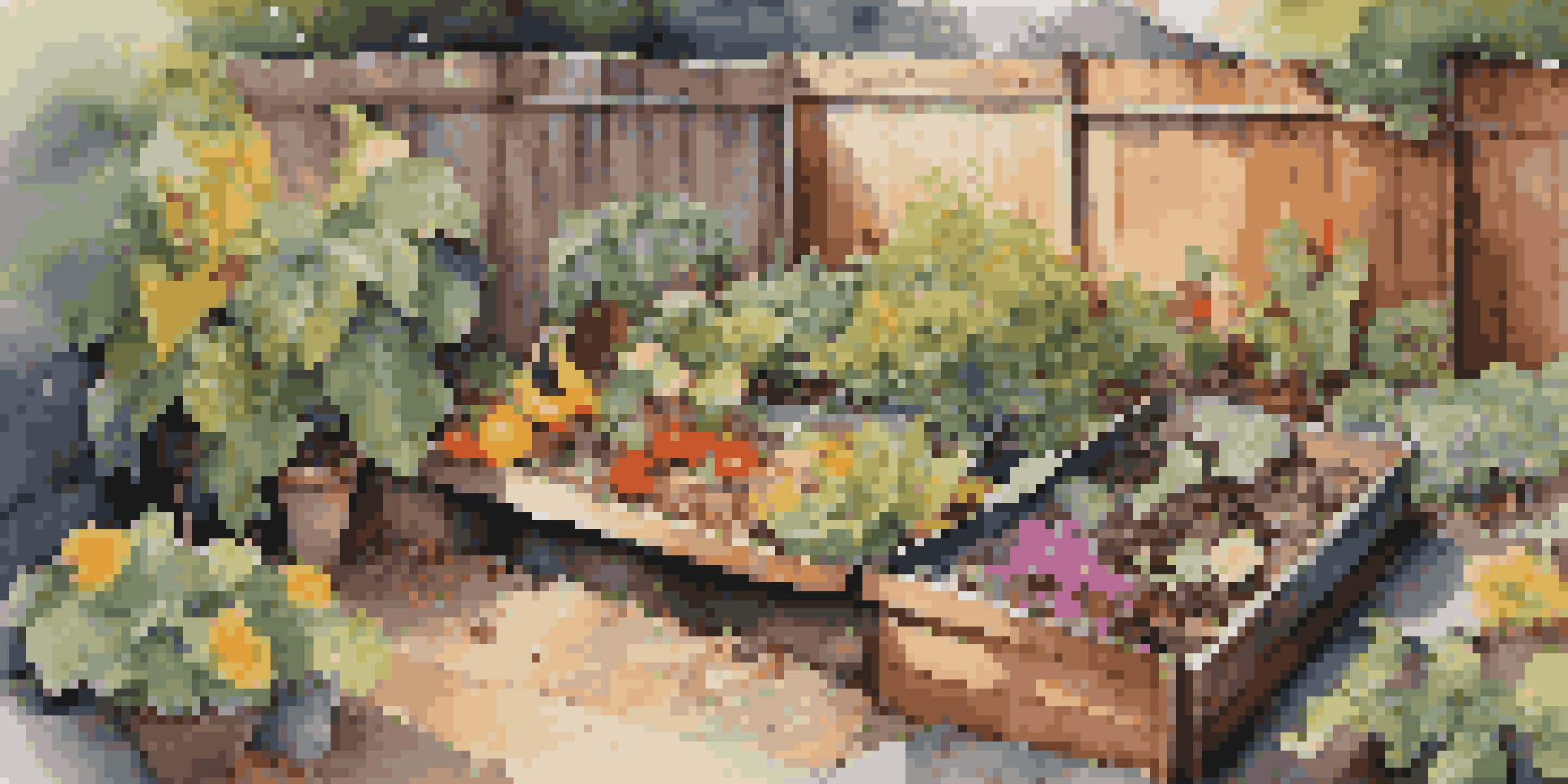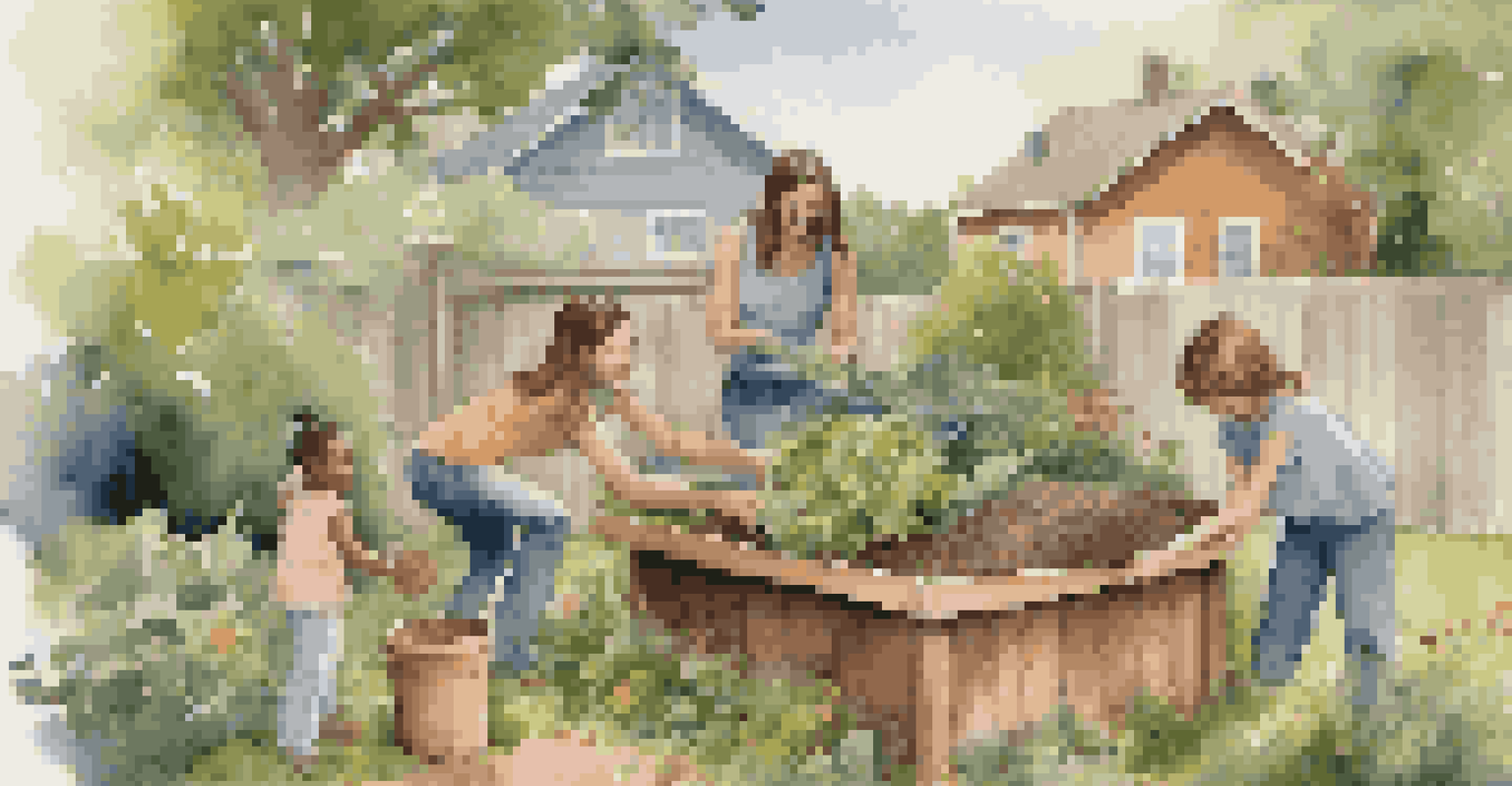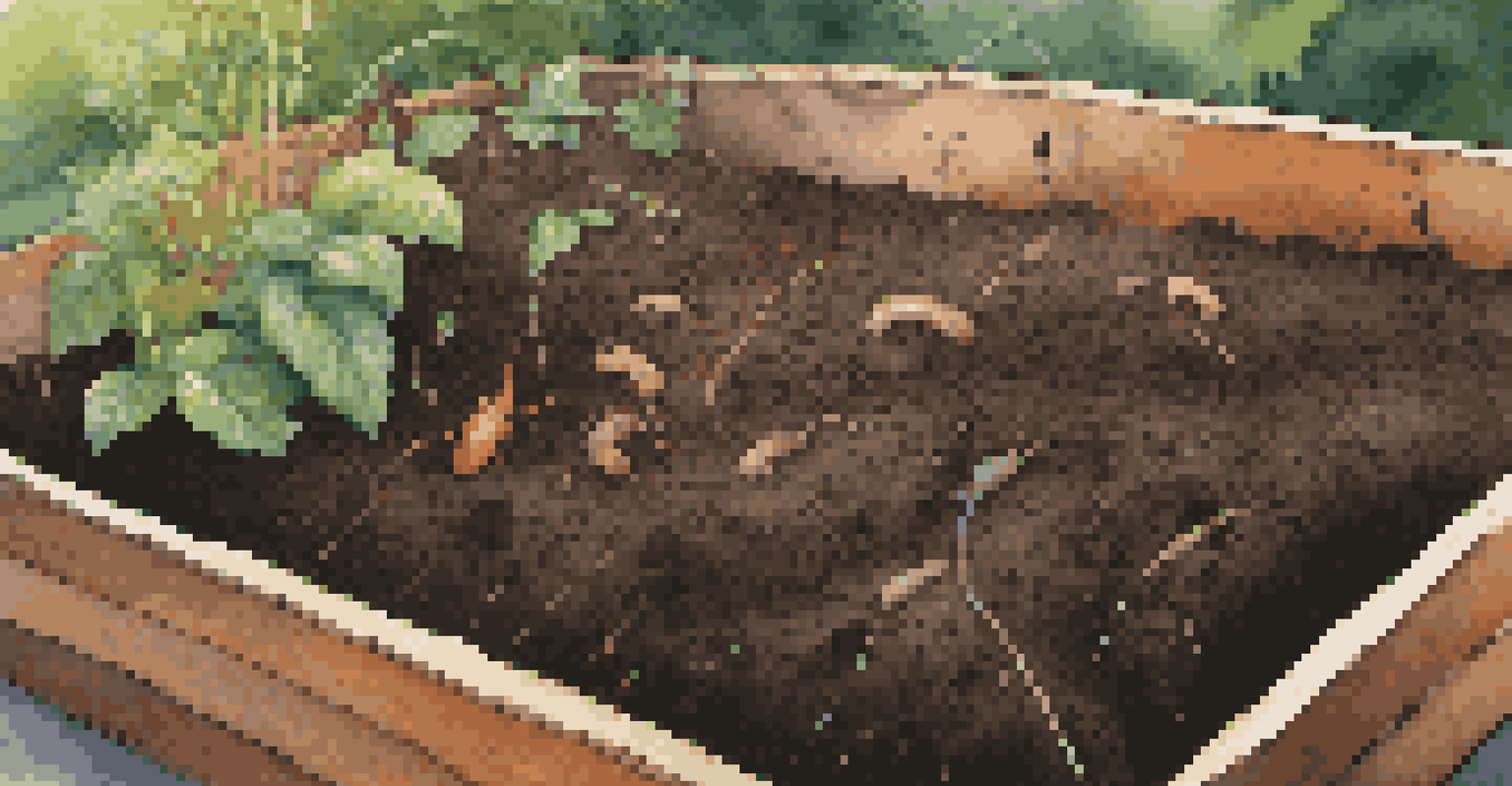The Benefits of Composting for Small Gardeners

Composting Turns Waste into Valuable Soil Nutrients
Composting is a fantastic way for small gardeners to recycle kitchen scraps and yard waste. Instead of tossing those banana peels and grass clippings in the trash, you can transform them into nutrient-rich compost. This natural process not only helps reduce landfill waste but also enriches your soil, making it healthier for your plants.
Composting is the most natural way to recycle and to create a healthier environment.
By composting, you’re creating a mini-ecosystem right in your backyard. Microorganisms break down organic matter, releasing essential nutrients that plants crave. Think of compost as a multivitamin for your garden; it feeds your plants and helps them thrive.
Plus, composting is a straightforward and rewarding process. All you need is a designated spot to pile up your materials, and with a little patience, you can enjoy the fruits of your labor in a flourishing garden.
Composting Saves Money on Gardening Supplies
If you’re looking to save on gardening costs, composting can be your best friend. Instead of purchasing expensive fertilizers and soil amendments, you can use homemade compost to boost your garden's health. This not only cuts down on expenses but also ensures that your garden is fed with natural nutrients.

Imagine the satisfaction of using something you would have thrown away to nourish your plants. It’s a win-win situation that promotes sustainability while keeping your wallet happy. Plus, as your garden flourishes, you might find yourself spending less on replacements for struggling plants.
Transform Waste into Nutrient-Rich Soil
Composting recycles kitchen scraps and yard waste, turning them into valuable nutrients that enrich your garden soil.
With composting, you’re investing in your garden’s future without breaking the bank. It’s a simple, eco-friendly practice that offers significant savings over time.
Composting Enhances Soil Structure and Health
One of the key benefits of composting is its ability to improve soil structure. When you mix compost into your garden beds, it helps create a well-balanced environment for your plants. The organic matter in compost increases soil aeration and drainage, which is crucial for healthy root development.
The greatest threat to our planet is the belief that someone else will save it.
Healthy soil is like a sponge; it retains moisture while allowing excess water to drain away. This means your plants can access water and nutrients more easily, leading to stronger growth and better yields. Think of compost as a builder, helping to create a sturdy, well-structured foundation for your plants.
In addition to improving structure, compost also fosters a rich community of beneficial microorganisms. These tiny allies work tirelessly to break down organic matter and promote nutrient availability, which ultimately supports your garden’s overall health.
Composting Reduces Greenhouse Gas Emissions
Composting is not just a garden benefit; it’s a win for the environment too. When organic waste ends up in landfills, it decomposes anaerobically, releasing harmful greenhouse gases like methane. By composting at home, small gardeners can significantly reduce their carbon footprint.
Think of composting as a small act with a big impact. Every banana peel and vegetable scrap you compost is one less item contributing to landfill emissions. This simple practice helps combat climate change and promotes a healthier planet.
Composting Saves Money on Supplies
By using homemade compost instead of buying fertilizers, gardeners can significantly reduce their gardening expenses.
Moreover, by enriching the soil with compost, you’re helping plants grow stronger, which means they can absorb more carbon dioxide from the atmosphere. It’s a beautiful cycle that benefits both your garden and the environment.
Composting Encourages Biodiversity in Your Garden
A diverse garden is a healthy garden, and composting plays a pivotal role in promoting biodiversity. By using compost, you’re creating a rich habitat for beneficial insects, earthworms, and microorganisms. These creatures contribute to a balanced ecosystem, improving pollination and pest control.
Imagine your garden as a bustling city, teeming with life. Each organism plays a part, from pollinators like bees to soil-dwelling worms that aerate the earth. Composting attracts these allies, enhancing your garden's resilience against pests and diseases.
As biodiversity increases, so does the overall health of your garden. By composting, you’re not just feeding your plants; you’re nurturing a vibrant community of life that benefits everyone.
Composting Helps Conserve Water in Your Garden
Water is precious, especially for gardeners. Composting can help you conserve water by improving soil’s moisture retention. When compost is mixed into the soil, it acts like a sponge, holding onto water and releasing it slowly to your plants.
This means you won’t have to water your garden as frequently, which is a big plus during hot summer months. Picture your garden thriving with less water; it’s a gardener's dream! Composting not only supports plant health but also helps you make the most of every drop.
Composting Boosts Garden Biodiversity
Creating compost fosters a habitat for beneficial organisms, enhancing pollination and pest control in your garden.
By conserving water through composting, you’re also contributing to a more sustainable gardening practice. It’s a small change that can lead to a significant difference in water usage and plant vitality.
Composting is a Fun and Educational Family Activity
Composting isn’t just beneficial for your garden; it’s also a great family activity. Involving children in the composting process teaches them about recycling, sustainability, and the environment. It’s a hands-on way to instill good habits and a love for nature.
Consider setting up a compost bin together and letting them choose what organic waste to add. This interactive approach makes learning fun and memorable. Plus, watching their contributions turn into rich compost is an exciting process that fosters a sense of responsibility.

As your family composts together, you’ll also create lasting memories while nurturing a deeper connection to your garden. It’s a wonderful way to bond over a shared goal of sustainability and growth.
Getting Started with Composting in Your Small Garden
Ready to dive into composting? Start small by choosing a compost bin or pile location in your garden. You can purchase a ready-made bin or create your own with materials like wood pallets. The key is to ensure it has good airflow and is easily accessible.
Next, begin adding organic materials like vegetable scraps, grass clippings, and dried leaves. Be sure to balance 'greens' (nitrogen-rich materials) with 'browns' (carbon-rich ones) for optimal decomposition. It’s like a recipe; finding the right mix will lead to the best results.
Remember, composting is a journey, not a race. With a bit of patience and regular turning, you’ll soon have a rich, dark compost that will elevate your small garden to new heights. Happy composting!